| Srl | Item |
| 1 |
ID:
143059
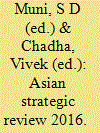

|
|
|
|
|
| Publication |
New Delhi, Pentagon Press, 2016.
|
| Description |
xiv, 380p.hbk
|
| Standard Number |
9788182748859
|
|
|
|
|
|
|
|
|
|
|
|
Copies: C:2/I:0,R:0,Q:0
Circulation
| Accession# | Call# | Current Location | Status | Policy | Location |
| 058437 | 355.005095/MUN 058437 | Main | On Shelf | General | |
| 058438 | 355.005095/MUN 058438 | Main | On Shelf | General | |
|
|
|
|
| 2 |
ID:
106256
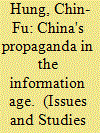

|
|
|
|
|
| Publication |
2011.
|
| Summary/Abstract |
Ever since the Mao era, propaganda has been the primary vehicle in China for the indoctrination and mass mobilization of citizens. In the last few years however, as China has continued to open up to the outside world and deepen its reforms, it has experienced an unprecedented boom and liberalization of its media sector. While the propaganda regime continues to attempt to guide and shape public opinion, the conventional propaganda apparatus is not as effective as it used to be. This has given rise to a new governing mechanism that employs Internet commentators to direct cyber discussions and create favorable online opinions about the party-state. Accordingly, this paper addresses the new phenomenon of Internet commentators and argues that the creation and increased utilization of such commentators has provided the Beijing governmentwith an up-to-date tool for disseminating and reinforcing party ideology and thought work in the information age. A case study of the Weng'an incident is discussed as a means through which to explore China's propaganda regime.
|
|
|
|
|
|
|
|
|
|
|
|
|
|
|
|
| 3 |
ID:
125439
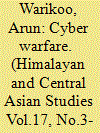

|
|
|
|
|
| Publication |
2013.
|
| Summary/Abstract |
The 21st century is rightly dubbed as an information age. Endless information is readily available made possible by interconnection of billions of computers systems globally over a backbone of networks commonly referred to as the internet the growing reliance on laptops, computer systems, ipads and smart phone to perform most of our tasks has created a parallel world the cyber world.
|
|
|
|
|
|
|
|
|
|
|
|
|
|
|
|
| 4 |
ID:
084183
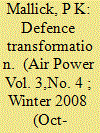

|
|
|
| 5 |
ID:
100433
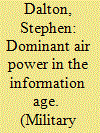

|
|
|
| 6 |
ID:
071514
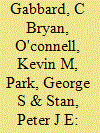

|
|
|
|
|
| Publication |
Santa Monica, Rand Corporation, 1996.
|
| Description |
iii, 33p.
|
| Standard Number |
0833024310
|
|
|
|
|
|
|
|
|
|
|
|
Copies: C:1/I:0,R:0,Q:0
Circulation
| Accession# | Call# | Current Location | Status | Policy | Location |
| 039611 | 621.3678/GAB 039611 | Main | On Shelf | General | |
|
|
|
|
| 7 |
ID:
140950
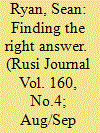

|
|
|
|
|
| Summary/Abstract |
Rapid changes in technology and the democratisation of information capabilities have sparked the concept of ‘War in the Information Age’. Intelligence branches within NATO militaries have been slow to adapt and risk being outpaced. Sean Ryan, a former British military intelligence officer, argues that while some structural changes have occurred, lessons from the Afghanistan and Iraq campaigns about the nature of modern intelligence have not yet been learned, and fundamental changes to the doctrine, training and culture of military intelligence are required.
|
|
|
|
|
|
|
|
|
|
|
|
|
|
|
|
| 8 |
ID:
018912
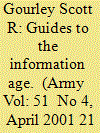

|
|
|
|
|
| Publication |
April 2001.
|
| Description |
21-24
|
|
|
|
|
|
|
|
|
|
|
|
|
|
|
|
| 9 |
ID:
128668


|
|
|
| 10 |
ID:
099971
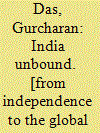

|
|
|
|
|
| Publication |
New Delhi, Penguin Books, 2010.
|
| Description |
xix, 419p.
|
| Standard Number |
9780413063018, hbk
|
|
|
|
|
|
|
|
|
|
|
|
Copies: C:1/I:0,R:0,Q:0
Circulation
| Accession# | Call# | Current Location | Status | Policy | Location |
| 055436 | 330.954/DAS 055436 | Main | On Shelf | General | |
|
|
|
|
| 11 |
ID:
119476
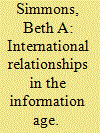

|
|
|
| 12 |
ID:
106923
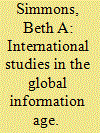

|
|
|
|
|
| Publication |
2011.
|
| Summary/Abstract |
The Global Information Age poses new and interesting questions for the study of international affairs. This Presidential Address surveys recent developments in commercialized and globalized information technologies that have and will continue to impact political and social relationships around the world. These new technologies affect power relationships among states, as well between states and civil society. They also present possibilities for new forms of global accountability and participation in governance. Finally, a range of technologies offer new and powerful ways to collect data for our research that allow us to ask new questions. President Simmons concludes as a result that exploratory empirical research is more enticing than ever before, but cautions that we should never think we can outsource the hard job of thinking to the very technologies that make innovative research possible in the first place.
|
|
|
|
|
|
|
|
|
|
|
|
|
|
|
|
| 13 |
ID:
143087
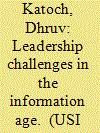

|
|
|
| 14 |
ID:
146323
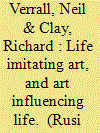

|
|
|
|
|
| Summary/Abstract |
Graffiti has had a chequered past in the art world and in society in general, and its use in warfare has also been underplayed. In this thought-provoking article, Neil Verrall and Richard Clay illuminate the historical role and impact of graffiti in society, art and war; they argue for a fresh look at its contemporary use within influence operations and behaviour change in a time of ‘warfare in the information age’.
|
|
|
|
|
|
|
|
|
|
|
|
|
|
|
|
| 15 |
ID:
017755
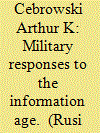

|
|
|
|
|
| Publication |
Oct 2000.
|
| Description |
25-29
|
|
|
|
|
|
|
|
|
|
|
|
|
|
|
|
| 16 |
ID:
138742
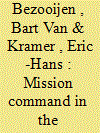

|
|
|
|
|
| Summary/Abstract |
Theory on the use of information technology in military operations assumes that bringing together units in an information network helps units to work together. Decentralized command systems such as mission command have been proposed for these networks, so that units can adapt to changes in their turbulent working environments. Others have proposed centralized command systems that permit higher organizational levels to closely direct military operations. This article uses Perrow’s (1984, 1999) Normal Accidents Theory to propose that increasing interdependencies between units in information networks places incompatible demands on the design of networked military operations. It is concluded that networked military operations require decentralized command approaches, but only under the condition that interdependencies between modules of networked units are weak rather than tight. This precondition is essential for retaining control over networked military operations.
|
|
|
|
|
|
|
|
|
|
|
|
|
|
|
|
| 17 |
ID:
145476
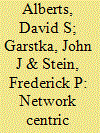

|
|
|
|
|
| Edition |
2nd ed.
|
| Publication |
New Delhi, Alpha Editions, 2016.
|
| Description |
xiv, 284p.: figurespbk
|
| Standard Number |
9789385505775
|
|
|
|
|
|
|
|
|
|
|
|
Copies: C:1/I:0,R:0,Q:0
Circulation
| Accession# | Call# | Current Location | Status | Policy | Location |
| 058677 | 355.02/ALB 058677 | Main | On Shelf | General | |
|
|
|
|
| 18 |
ID:
091544
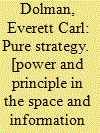

|
|
|
|
|
| Publication |
London, Frank Cass, 2005.
|
| Description |
xiv, 218p.
|
| Series |
Cass series-strategy and history;6
|
| Standard Number |
9780714684987
|
|
|
|
|
|
|
|
|
|
|
|
Copies: C:1/I:0,R:0,Q:0
Circulation
| Accession# | Call# | Current Location | Status | Policy | Location |
| 054444 | 355.02/DOL 054444 | Main | On Shelf | General | |
|
|
|
|
| 19 |
ID:
095867
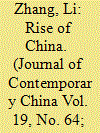

|
|
|
|
|
| Publication |
2010.
|
| Summary/Abstract |
In recent years, the rise of China as an emerging great power has been widely perceived across the world. How has the rise of China been represented over time in the Western news media? Has the image of China as a rising power had any impact on the country's soft power? These questions remain unanswered but answering them is of great significance in helping us understand the impact of the news media on the transformation of international politics in the information age. This paper conducts a longitudinal study to examine the nature of Chinese coverage and explores how the image of a rising China-economically, politically, regionally and globally-has been represented in three transnational newspapers in Europe. It further argues that the Western media coverage of China's rise is as a soft power, which, to some extent, has an impact upon China's foreign relations.
|
|
|
|
|
|
|
|
|
|
|
|
|
|
|
|
| 20 |
ID:
145239
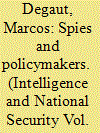

|
|
|
|
|
| Summary/Abstract |
Massive changes and continuous developments in the uses and applications of technology and communications have changed the way we see the world. The Information Revolution has had an impact upon intelligence collection, processing, analysis, and dissemination, and upon the way policymakers can access reliable information, in a timely manner, and upon the sources they are most likely to rely on when a specific piece of information is needed to support a decision. This study attempts to describe, analyze and explain the nature of the ongoing Information Revolution, to present its main impacts on the intelligence and policy communities, to discuss the relationship between the Intelligence Community and policymakers, and to propose what the IC should do to meet the high expectations of decision-makers.
|
|
|
|
|
|
|
|
|
|
|
|
|
|
|
|